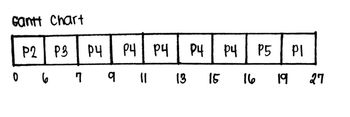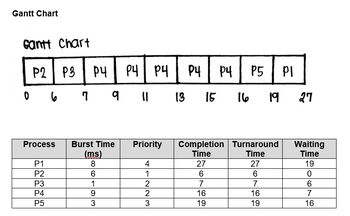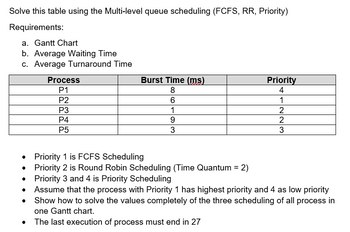Can you fix the code of the completion time based on the gantt chart and the output of the completion time must be the same in the image below? Thank you!
Can you fix the code of the completion time based on the gantt chart and the output of the completion time must be the same in the image below? Thank you!
Code:
#include <iostream>
#include <queue>
#include <string>
#include <
struct Process {
int processId;
int burstTime;
int priority;
};
void print_gantt_chart(const std::vector<std::pair<int, int>>& gantt_chart) {
std::cout << "Gantt Chart:" << std::endl;
std::cout << "----------------------------------------------------------------------------" << std::endl;
std::cout << "| ";
for (const auto& process : gantt_chart) {
std::cout << "P" << process.first << " | ";
}
std::cout << std::endl;
std::cout << "----------------------------------------------------------------------------" << std::endl;
std::cout << "0 ";
int currentTime = 0;
for (const auto& process : gantt_chart) {
currentTime += process.second;
if (std::to_string(currentTime).length() == 1)
std::cout << " " << currentTime << " ";
else
std::cout << " " << currentTime << " ";
}
std::cout << std::endl;
}
void multiLevelQueueScheduling(const std::vector<Process>& processes, int quantumTime) {
std::queue<Process> fcfs;
std::queue<Process> rr;
std::queue<Process> priority;
for (const auto& process : processes) {
if (process.priority == 1)
fcfs.push(process);
else if (process.priority == 2)
rr.push(process);
else if (process.priority == 3 || process.priority == 4)
priority.push(process);
}
std::vector<std::pair<int, int>> gantt_chart;
while (!fcfs.empty() || !rr.empty() || !priority.empty()) {
if (!fcfs.empty()) {
Process process = fcfs.front();
fcfs.pop();
int executionTime = std::min(quantumTime, process.burstTime);
process.burstTime -= executionTime;
gantt_chart.emplace_back(process.processId, executionTime);
if (process.burstTime > 0)
fcfs.push(process);
}
if (!rr.empty()) {
Process process = rr.front();
rr.pop();
int executionTime = std::min(quantumTime, process.burstTime);
process.burstTime -= executionTime;
gantt_chart.emplace_back(process.processId, executionTime);
if (process.burstTime > 0)
rr.push(process);
}
if (!priority.empty()) {
Process process = priority.front();
priority.pop();
int executionTime = std::min(quantumTime, process.burstTime);
process.burstTime -= executionTime;
gantt_chart.emplace_back(process.processId, executionTime);
if (process.burstTime > 0)
priority.push(process);
}
}
print_gantt_chart(gantt_chart);
std::vector<int> completionTime(processes.size());
std::vector<int> turnaroundTime(processes.size());
std::vector<int> waitingTime(processes.size());
int currentEndTime = 0;
for (const auto& process : processes) {
int processIndex = process.processId - 1;
currentEndTime += process.burstTime;
completionTime[processIndex] = currentEndTime;
turnaroundTime[processIndex] = completionTime[processIndex];
waitingTime[processIndex] = turnaroundTime[processIndex] - process.burstTime;
}
std::cout << "\nProcess\t\tBurst Time\t\tPriority\t\tCompletion Time\t\tTurnaround Time\t\tWaiting Time" << std::endl;
for (const auto& process : processes) {
int processIndex = process.processId - 1;
std::cout << "P" << process.processId << "\t\t" << process.burstTime << "\t\t\t" << process.priority << "\t\t\t"
<< completionTime[processIndex] << "\t\t\t" << turnaroundTime[processIndex] << "\t\t\t" << waitingTime[processIndex] << std::endl;
}
float avgWaitingTime = 0;
float avgTurnaroundTime = 0;
for (const auto& process : processes) {
avgWaitingTime += waitingTime[process.processId - 1];
avgTurnaroundTime += turnaroundTime[process.processId - 1];
}
avgWaitingTime /= processes.size();
avgTurnaroundTime /= processes.size();
std::cout << std::endl;
std::cout << "Average Waiting Time: " << avgWaitingTime << std::endl;
std::cout << "Average Turnaround Time: " << avgTurnaroundTime << std::endl;
}
int main() {
std::vector<Process> processes = {
{1, 8, 4},
{2, 6, 1},
{3, 1, 2},
{4, 9, 2},
{5, 3, 3}
};
int quantumTime = 2;
multiLevelQueueScheduling(processes, quantumTime);
return 0;
}

Step by step
Solved in 4 steps with 2 images

Can you fix the output of the Gantt chart in the code and the output of the gantt chart should be the same in the image below? The instruction also on how to solve the Gantt chart is in the image below. Badly need to fix it :( Thank you!
Code:
#include <iostream>
#include <queue>
#include <string>
#include <
struct Process {
int processId;
int burstTime;
int priority;
};
void print_gantt_chart(const std::vector<std::pair<int, int>>& gantt_chart) {
std::cout << "Gantt Chart:" << std::endl;
std::cout << "----------------------------------------------------------------------------" << std::endl;
std::cout << "| ";
for (const auto& process : gantt_chart) {
std::cout << "P" << process.first << " | ";
}
std::cout << std::endl;
std::cout << "----------------------------------------------------------------------------" << std::endl;
std::cout << "0 ";
int currentTime = 0;
for (const auto& process : gantt_chart) {
currentTime += process.second;
if (std::to_string(currentTime).length() == 1)
std::cout << " " << currentTime << " ";
else
std::cout << " " << currentTime << " ";
}
std::cout << std::endl;
}
void multiLevelQueueScheduling(const std::vector<Process>& processes, int quantumTime) {
std::queue<Process> fcfs;
std::queue<Process> rr;
std::queue<Process> priority;
// Splitting the processes into different queues based on priority
for (const auto& process : processes) {
if (process.priority == 1)
fcfs.push(process);
else if (process.priority == 2)
rr.push(process);
else if (process.priority == 3 || process.priority == 4)
priority.push(process);
}
std::vector<std::pair<int, int>> gantt_chart;
while (!fcfs.empty() || !rr.empty() || !priority.empty()) {
// FCFS Scheduling
if (!fcfs.empty()) {
Process process = fcfs.front();
fcfs.pop();
int executionTime = std::min(quantumTime, process.burstTime);
process.burstTime -= executionTime;
gantt_chart.emplace_back(process.processId, executionTime);
if (process.burstTime > 0)
fcfs.push(process);
}
// RR Scheduling
if (!rr.empty()) {
Process process = rr.front();
rr.pop();
int executionTime = std::min(quantumTime, process.burstTime);
process.burstTime -= executionTime;
gantt_chart.emplace_back(process.processId, executionTime);
if (process.burstTime > 0)
rr.push(process);
}
// Priority Scheduling
if (!priority.empty()) {
Process process = priority.front();
priority.pop();
int executionTime = std::min(quantumTime, process.burstTime);
process.burstTime -= executionTime;
gantt_chart.emplace_back(process.processId, executionTime);
if (process.burstTime > 0)
priority.push(process);
}
}
print_gantt_chart(gantt_chart);
std::vector<int> completionTime(processes.size());
std::vector<int> turnaroundTime(processes.size());
std::vector<int> waitingTime(processes.size());
int currentEndTime = 0;
for (const auto& process : gantt_chart) {
int processIndex = process.first - 1;
currentEndTime += process.second;
completionTime[processIndex] = currentEndTime;
turnaroundTime[processIndex] = completionTime[processIndex];
waitingTime[processIndex] = turnaroundTime[processIndex] - processes[processIndex].burstTime;
}
std::cout << "\nProcess\t\tBurst Time\t\tPriority\t\tCompletion Time\t\tTurnaround Time\t\tWaiting Time" << std::endl;
for (const auto& process : processes) {
int processIndex = process.processId - 1;
std::cout << "P" << process.processId << "\t\t" << process.burstTime << "\t\t\t" << process.priority << "\t\t\t"
<< completionTime[processIndex] << "\t\t\t" << turnaroundTime[processIndex] << "\t\t\t" << waitingTime[processIndex] << std::endl;
}
float avgWaitingTime = 0;
float avgTurnaroundTime = 0;
for (const auto& process : processes) {
avgWaitingTime += waitingTime[process.processId - 1];
avgTurnaroundTime += turnaroundTime[process.processId - 1];
}
avgWaitingTime /= processes.size();
avgTurnaroundTime /= processes.size();
std::cout << std::endl;
std::cout << "Average Waiting Time: " << avgWaitingTime << std::endl;
std::cout << "Average Turnaround Time: " << avgTurnaroundTime << std::endl;
}
int main() {
std::vector<Process> processes = {
{1, 8, 4},
{2, 6, 1},
{3, 1, 2},
{4, 9, 2},
{5, 3, 3}
};
int quantumTime = 2;
multiLevelQueueScheduling(processes, quantumTime);
return 0;
}


Can you fix the code and the gantt chart? The output should be same as the image below?
Code:
#include <iostream>
#include <queue>
#include <string>
#include <
struct Process {
int processId;
int burstTime;
int priority;
};
void print_gantt_chart(const std::vector<std::pair<int, int>>& gantt_chart) {
std::cout << "Gantt Chart:" << std::endl;
std::cout << "----------------------------------------------------------------------------" << std::endl;
std::cout << "| ";
for (const auto& process : gantt_chart) {
std::cout << "P" << process.first << " | ";
}
std::cout << std::endl;
std::cout << "----------------------------------------------------------------------------" << std::endl;
std::cout << "0 ";
int currentTime = 0;
for (const auto& process : gantt_chart) {
currentTime += process.second;
if (std::to_string(currentTime).length() == 1)
std::cout << " " << currentTime << " ";
else
std::cout << " " << currentTime << " ";
}
std::cout << std::endl;
}
void multiLevelQueueScheduling(const std::vector<Process>& processes, int quantumTime) {
std::queue<Process> fcfs;
std::queue<Process> rr;
std::queue<Process> priority;
// Splitting the processes into different queues based on priority
for (const auto& process : processes) {
if (process.priority == 1)
fcfs.push(process);
else if (process.priority == 2)
rr.push(process);
else if (process.priority == 3 || process.priority == 4)
priority.push(process);
}
std::vector<std::pair<int, int>> gantt_chart;
while (!fcfs.empty() || !rr.empty() || !priority.empty()) {
// FCFS Scheduling
if (!fcfs.empty()) {
Process process = fcfs.front();
fcfs.pop();
int executionTime = std::min(quantumTime, process.burstTime);
process.burstTime -= executionTime;
gantt_chart.emplace_back(process.processId, executionTime);
if (process.burstTime > 0)
fcfs.push(process);
}
// RR Scheduling
if (!rr.empty()) {
Process process = rr.front();
rr.pop();
int executionTime = std::min(quantumTime, process.burstTime);
process.burstTime -= executionTime;
gantt_chart.emplace_back(process.processId, executionTime);
if (process.burstTime > 0)
rr.push(process);
}
// Priority Scheduling
if (!priority.empty()) {
Process process = priority.front();
priority.pop();
int executionTime = std::min(quantumTime, process.burstTime);
process.burstTime -= executionTime;
gantt_chart.emplace_back(process.processId, executionTime);
if (process.burstTime > 0)
priority.push(process);
}
}
print_gantt_chart(gantt_chart);
std::vector<int> completionTime(processes.size());
std::vector<int> turnaroundTime(processes.size());
std::vector<int> waitingTime(processes.size());
int currentEndTime = 0;
for (const auto& process : gantt_chart) {
int processIndex = process.first - 1;
currentEndTime += process.second;
completionTime[processIndex] = currentEndTime;
turnaroundTime[processIndex] = completionTime[processIndex];
waitingTime[processIndex] = turnaroundTime[processIndex] - processes[processIndex].burstTime;
}
std::cout << "\nProcess\t\tBurst Time\t\tPriority\t\tCompletion Time\t\tTurnaround Time\t\tWaiting Time" << std::endl;
for (const auto& process : processes) {
int processIndex = process.processId - 1;
std::cout << "P" << process.processId << "\t\t" << process.burstTime << "\t\t\t" << process.priority << "\t\t\t"
<< completionTime[processIndex] << "\t\t\t" << turnaroundTime[processIndex] << "\t\t\t" << waitingTime[processIndex] << std::endl;
}
float avgWaitingTime = 0;
float avgTurnaroundTime = 0;
for (const auto& process : processes) {
avgWaitingTime += waitingTime[process.processId - 1];
avgTurnaroundTime += turnaroundTime[process.processId - 1];
}
avgWaitingTime /= processes.size();
avgTurnaroundTime /= processes.size();
std::cout << std::endl;
std::cout << "Average Waiting Time: " << avgWaitingTime << std::endl;
std::cout << "Average Turnaround Time: " << avgTurnaroundTime << std::endl;
}
int main() {
std::vector<Process> processes = {
{1, 8, 4},
{2, 6, 1},
{3, 1, 2},
{4, 9, 2},
{5, 3, 3}
};
int quantumTime = 2;
multiLevelQueueScheduling(processes, quantumTime);
return 0;
}

Can you provide a step-by-step procedure on how to solve this image below for better understanding of multilevel queue scheduling? thank you!

Can you fix and change the code of Splitting the processes into different queues based on priority, FCFS Scheduling, RR Scheduling, and Priority Scheduling into new code? The new code is provided in the image below and please show the output. Thank you!
Code:
#include <iostream>
#include <queue>
#include <string>
#include <
struct Process {
int processId;
int burstTime;
int priority;
};
void print_gantt_chart(const std::vector<std::pair<int, int>>& gantt_chart) {
std::cout << "Gantt Chart:" << std::endl;
std::cout << "----------------------------------------------------------------------------" << std::endl;
std::cout << "| ";
for (const auto& process : gantt_chart) {
std::cout << "P" << process.first << " | ";
}
std::cout << std::endl;
std::cout << "----------------------------------------------------------------------------" << std::endl;
std::cout << "0 ";
int currentTime = 0;
for (const auto& process : gantt_chart) {
currentTime += process.second;
if (std::to_string(currentTime).length() == 1)
std::cout << " " << currentTime << " ";
else
std::cout << " " << currentTime << " ";
}
std::cout << std::endl;
}
void multiLevelQueueScheduling(const std::vector<Process>& processes, int quantumTime) {
std::queue<Process> fcfs;
std::queue<Process> rr;
std::queue<Process> priority;
// Splitting the processes into different queues based on priority
for (const auto& process : processes) {
if (process.priority == 1)
fcfs.push(process);
else if (process.priority == 2)
rr.push(process);
else if (process.priority == 3 || process.priority == 4)
priority.push(process);
}
std::vector<std::pair<int, int>> gantt_chart;
while (!fcfs.empty() || !rr.empty() || !priority.empty()) {
// FCFS Scheduling
if (!fcfs.empty()) {
Process process = fcfs.front();
fcfs.pop();
int executionTime = std::min(quantumTime, process.burstTime);
process.burstTime -= executionTime;
gantt_chart.emplace_back(process.processId, executionTime);
if (process.burstTime > 0)
fcfs.push(process);
}
// RR Scheduling
if (!rr.empty()) {
Process process = rr.front();
rr.pop();
int executionTime = std::min(quantumTime, process.burstTime);
process.burstTime -= executionTime;
gantt_chart.emplace_back(process.processId, executionTime);
if (process.burstTime > 0)
rr.push(process);
}
// Priority Scheduling
if (!priority.empty()) {
Process process = priority.front();
priority.pop();
int executionTime = std::min(quantumTime, process.burstTime);
process.burstTime -= executionTime;
gantt_chart.emplace_back(process.processId, executionTime);
if (process.burstTime > 0)
priority.push(process);
}
}
print_gantt_chart(gantt_chart);
std::vector<int> completionTime(processes.size());
std::vector<int> turnaroundTime(processes.size());
std::vector<int> waitingTime(processes.size());
int currentEndTime = 0;
for (const auto& process : gantt_chart) {
int processIndex = process.first - 1;
currentEndTime += process.second;
completionTime[processIndex] = currentEndTime;
turnaroundTime[processIndex] = completionTime[processIndex];
waitingTime[processIndex] = turnaroundTime[processIndex] - processes[processIndex].burstTime;
}
std::cout << "\nProcess\t\tBurst Time\t\tPriority\t\tCompletion Time\t\tTurnaround Time\t\tWaiting Time" << std::endl;
for (const auto& process : processes) {
int processIndex = process.processId - 1;
std::cout << "P" << process.processId << "\t\t" << process.burstTime << "\t\t\t" << process.priority << "\t\t\t"
<< completionTime[processIndex] << "\t\t\t" << turnaroundTime[processIndex] << "\t\t\t" << waitingTime[processIndex] << std::endl;
}
float avgWaitingTime = 0;
float avgTurnaroundTime = 0;
for (const auto& process : processes) {
avgWaitingTime += waitingTime[process.processId - 1];
avgTurnaroundTime += turnaroundTime[process.processId - 1];
}
avgWaitingTime /= processes.size();
avgTurnaroundTime /= processes.size();
std::cout << std::endl;
std::cout << "Average Waiting Time: " << avgWaitingTime << std::endl;
std::cout << "Average Turnaround Time: " << avgTurnaroundTime << std::endl;
}
int main() {
std::vector<Process> processes = {
{1, 8, 4},
{2, 6, 1},
{3, 1, 2},
{4, 9, 2},
{5, 3, 3}
};
int quantumTime = 2;
multiLevelQueueScheduling(processes, quantumTime);
return 0;
}
![New Code:
// Splitting the processes into different queues based on priority
for (int i = 0; i < totalProcesses; i++) {
if (processes [i].priority == 1)
fcfsQueue.push(processes [i]);
else if (processes[i].priority == 2)
rrQueue.push(processes [i]);
else if (processes[i].priority == 3)
priorityQueue.push(processes[i]);
}
// FCFS Scheduling
int time = 0;
while (!fcfsQueue.empty()) {
Process currentProcess = fcfsQueue.front();
fcfsQueue.pop();
waiting Times [current Process.processld - 1] = time;
time += currentProcess.burst Time;
turnaroundTimes[currentProcess.processld - 1] = time;
}
// RR Scheduling
while (!rrQueue.empty()) {
Process current Process = rrQueue.front();
rrQueue.pop();
}
waiting Times[current Process.processid - 1] = time;
if (currentProcess.burstTime > 2) {
currentProcess.burstTime -= 2;
time += 2;
rrQueue.push(currentProcess);
} else {
time += currentProcess.burst Time;
turnaroundTimes[currentProcess.processld - 1] = time;
}
}
// Priority Scheduling
while (!priorityQueue.empty()) {
Process currentProcess = priorityQueue.top();
priorityQueue.pop();
waiting Times [current Process.processld - 1] = time;
time += currentProcess.burst Time;
turnaroundTimes[currentProcess.processld-
1] = time;](https://content.bartleby.com/qna-images/question/58dd768f-8c36-4170-80fa-1dffd6b7b187/f2088ebe-3010-425e-ae97-e96fc9d6d7c0/idgl53_thumbnail.png)
Can you fix the code by adding if all of the processes in the Arrival Time is 0 and the output must be the same in the image below? Thank you!
Code:
#include <iostream>
#include <queue>
#include <string>
#include <
struct Process {
int processId;
int burstTime;
int priority;
};
void print_gantt_chart(const std::vector<std::pair<int, int>>& gantt_chart) {
std::cout << "Gantt Chart:" << std::endl;
std::cout << "----------------------------------------------------------------------------" << std::endl;
std::cout << "| ";
for (const auto& process : gantt_chart) {
std::cout << "P" << process.first << " | ";
}
std::cout << std::endl;
std::cout << "----------------------------------------------------------------------------" << std::endl;
std::cout << "0 ";
int currentTime = 0;
for (const auto& process : gantt_chart) {
currentTime += process.second;
if (std::to_string(currentTime).length() == 1)
std::cout << " " << currentTime << " ";
else
std::cout << " " << currentTime << " ";
}
std::cout << std::endl;
}
void multiLevelQueueScheduling(const std::vector<Process>& processes, int quantumTime) {
std::queue<Process> fcfs;
std::queue<Process> rr;
std::queue<Process> priority;
for (const auto& process : processes) {
if (process.priority == 1)
fcfs.push(process);
else if (process.priority == 2)
rr.push(process);
else if (process.priority == 3 || process.priority == 4)
priority.push(process);
}
std::vector<std::pair<int, int>> gantt_chart;
while (!fcfs.empty() || !rr.empty() || !priority.empty()) {
if (!fcfs.empty()) {
Process process = fcfs.front();
fcfs.pop();
int executionTime = std::min(quantumTime, process.burstTime);
process.burstTime -= executionTime;
gantt_chart.emplace_back(process.processId, executionTime);
if (process.burstTime > 0)
fcfs.push(process);
}
if (!rr.empty()) {
Process process = rr.front();
rr.pop();
int executionTime = std::min(quantumTime, process.burstTime);
process.burstTime -= executionTime;
gantt_chart.emplace_back(process.processId, executionTime);
if (process.burstTime > 0)
rr.push(process);
}
if (!priority.empty()) {
Process process = priority.front();
priority.pop();
int executionTime = std::min(quantumTime, process.burstTime);
process.burstTime -= executionTime;
gantt_chart.emplace_back(process.processId, executionTime);
if (process.burstTime > 0)
priority.push(process);
}
}
print_gantt_chart(gantt_chart);
std::vector<int> completionTime(processes.size());
std::vector<int> turnaroundTime(processes.size());
std::vector<int> waitingTime(processes.size());
int currentEndTime = 0;
for (const auto& process : gantt_chart) {
int processIndex = process.first - 1;
currentEndTime += process.second;
completionTime[processIndex] = currentEndTime;
turnaroundTime[processIndex] = completionTime[processIndex];
waitingTime[processIndex] = turnaroundTime[processIndex] - processes[processIndex].burstTime;
}
std::cout << "\nProcess\t\tBurst Time\t\tPriority\t\tCompletion Time\t\tTurnaround Time\t\tWaiting Time" << std::endl;
for (const auto& process : processes) {
int processIndex = process.processId - 1;
std::cout << "P" << process.processId << "\t\t" << process.burstTime << "\t\t\t" << process.priority << "\t\t\t"
<< completionTime[processIndex] << "\t\t\t" << turnaroundTime[processIndex] << "\t\t\t" << waitingTime[processIndex] << std::endl;
}
float avgWaitingTime = 0;
float avgTurnaroundTime = 0;
for (const auto& process : processes) {
avgWaitingTime += waitingTime[process.processId - 1];
avgTurnaroundTime += turnaroundTime[process.processId - 1];
}
avgWaitingTime /= processes.size();
avgTurnaroundTime /= processes.size();
std::cout << std::endl;
std::cout << "Average Waiting Time: " << avgWaitingTime << std::endl;
std::cout << "Average Turnaround Time: " << avgTurnaroundTime << std::endl;
}
int main() {
std::vector<Process> processes = {
{1, 8, 4},
{2, 6, 1},
{3, 1, 2},
{4, 9, 2},
{5, 3, 3}
};
int quantumTime = 2;
multiLevelQueueScheduling(processes, quantumTime);
return 0;
}









